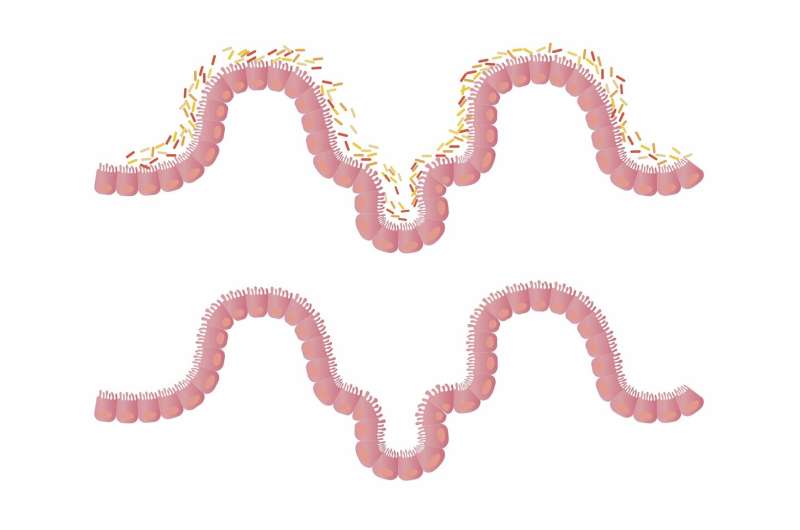Researchers develop approach to alter intestinal microbiota, vaccinate against inflammatory diseases

Targeted immunization against bacterial flagellin, a protein that forms the appendage that enables bacterial mobility, can beneficially alter the intestinal microbiota, decreasing the bacteria's ability to cause inflammation and thus protecting against an array of chronic inflammatory diseases, according to a new study by the Institute for Biomedical Sciences and the Neuroscience Institute at Georgia State University.
The findings, published in the journal Nature Communications, suggest this approach offers a way to vaccinate against diseases associated with chronic inflammation of the digestive tract, a group of diseases that includes inflammatory bowel diseases, as well as obesity and metabolic syndrome.
The intestinal tract is colonized by billions of bacteria and other microorganisms that play numerous beneficial roles, but improperly controlled microbiota can lead to chronic inflammatory diseases. Previous studies have shown the intestinal microbiota are associated with inflammatory bowel diseases, such as ulcerative colitis and Crohn's disease, and diseases characterized by low-grade inflammation of the intestinal tract, such as obesity and metabolic syndrome.
Therapeutic options have focused on lessening the inflammatory response and have often overlooked the contribution of the intestinal microbiota. The researchers wanted to determine if a targeted immune response could be used to beneficially shape the intestinal microbiota and protect against inflammatory diseases. Previously, they found that a common feature of microbiotas associated with inflammation is an increased level of expression of flagellin by select microbiota members, which can drive bacteria to penetrate the intestinal mucosa and disrupt homeostasis.
The researchers immunized mice with flagellin to elicit an adaptative immune response and demonstrated targeted immunization against bacterial flagellin is sufficient to beneficially alter the composition and function of the intestinal microbiota. Anti-flagellin antibodies were produced and affected the microbiota by reducing its pro-inflammatory potential and ability to penetrate its host. These alterations were associated with protection against chronic inflammatory diseases.
"The administration of flagellin, and perhaps other bacterial antigens, has the potential to vaccinate against an array of diseases associated with, and driven by gut inflammation," said Dr. Benoit Chassaing, senior author of the study and assistant professor in the Neuroscience Institute and the Institute for Biomedical Sciences at Georgia State and team leader at the National Institute for Health and Medical Research and the Universite de Paris in Paris, France. "This work is a proof of concept and demonstrates that targeted training of the immune system can protect against an array of chronic inflammatory diseases. Yet, significant work is now needed to test other antigens, other immunization routes and additional inflammatory models, as well as the human relevance of these findings."
"If the approach proves translatable to humans, its impact on public health would be enormous," adds co-author Dr. Andrew Gewirtz, a professor in Georgia State's Institute for Biomedical Sciences.




















